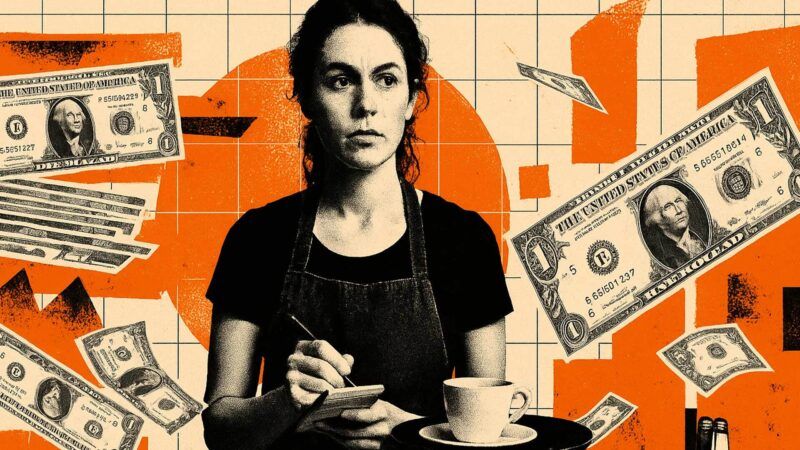D.C. Pauses Plans To Hike Minimum Wage for Tipped Workers
The issue has long polarized a city that is dominated by liberal and progressive politics and politicians, some of whom have confronted that good intentions do not equal good outcomes here.

Washington, D.C. will pause the implementation of a measure that is set to eliminate the city's tipped wage system, as the yearslong debate over the law's adverse impacts continues to divide the District's left-leaning lawmakers.
The D.C. Council on Tuesday voted 8–4 to pump the brakes on Initiative 82, the 2022 ballot referendum that mandated employers pay service workers the full minimum wage, as opposed to the traditional lower base pay that employees supplement with gratuities. (Employers were already required to make up the difference if an employee's take-home pay with tips did not equal the minimum wage.) Initiative 82 requires yearly increases to the city's tipped wage—which was previously $5.35 per hour—until it meets D.C.'s full minimum base pay—set to increase next month to $17.95 per hour—in 2027.
July was supposed to see the tipped wage rise from $10 to $12. The Council's vote will delay that increase until October as Mayor Muriel Bowser, a Democrat, advocates for overturning the law entirely.
This saga has been ongoing. D.C. voters weighed in on the issue in June 2018 when a majority approved Initiative 77, a ballot referendum that also abolished the tipped wage. But the Council countermanded that in October of that same year by a vote of 8–5, leading to a public outcry from some who said the government was undoing the will of the people.
Indeed, the issue has long polarized a city that is dominated by liberal and progressive politics and politicians, some of whom have confronted that good intentions do not equal good outcomes. Restaurants often operate on thin profit margins; many simply cannot afford an explosive increase in labor costs. And a great deal of service workers themselves—who are in an industry that is not exactly known for being conservative politically—opposed the abolition of the tipped wage, knowing it could lead to a drop-off in job opportunities, hours, take-home pay, and viable restaurants.
That was the general message Bowser sought to convey in a press conference last month when she announced her FY26 budget would push to overturn Initiative 82. "DC restaurants are facing a perfect storm—from increased operating and supply costs, to higher rents, and unique labor challenges," her presentation said. It also cited an April article in The Washington Post that noted food establishments in the District have been "pushed to the brink."
That outcome should not have been a surprise. As I wrote in 2018 after Initiative 77 passed:
In the wake of Seattle's 2015 minimum wage hike, the University of Washington conducted a study to explore long-term effects. While the policy is still too young to definitively assess the total impact on restaurants, findings suggest that food-service establishments hit a proverbial fork in the road: switch to a counter-service model or make the place an extravagant dining experience. The former all but eliminates tipping, hampering staff opportunity to maximize income. The latter increases prices drastically for the consumer, turning a casual lunch outing into an elitist affair.
Somewhat puzzlingly, it also found that a significant portion of restaurant base wages surpassed $19 an hour, whereas positions paying the minimum plunged. That suggests an unfortunate trend: Many restauranteurs appear to be adapting to the higher wage requirements by prioritizing high-skill employees while kicking low-skill workers to the curb—the very people that Initiative 77 purports to help.
Meanwhile, over in San Francisco, researchers from Harvard analyzed the dining scene and found that for every additional dollar added to the tipped wage, there was an additional 14 percent chance that a median rated restaurant (3.5 stars on Yelp) would close. Those aren't great odds for mom-n-pop neighborhood staples—particularly of the hole-in-the-wall variety—many of which are located in the District's low-income areas.
Fast-forward to today, and those dire predictions are already becoming reality across D.C., even before the full minimum wage hits restaurants. "We're watching a beloved bar back, a beloved busser, a dishwasher have their jobs taken away," Valerie Graham, a D.C. restaurant worker, told Reason's Justin Zuckerman in his recent documentary about the fight to end the tipped wage. Chef Geoff Tracy, who owns two restaurants in D.C., meanwhile estimated that the law would add $400,000 to his payroll costs each year. There are countless more examples.
It is understandably jarring for some to wrap their heads around the fact that many workers would prefer a lower minimum wage. It may not pop on a poster or in a chant at a rally. But economic reality is often more complicated than a protest sign can pithily convey.


Show Comments (20)